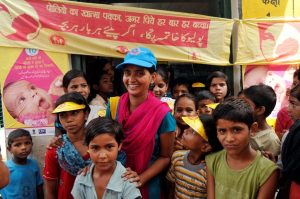Finishing the job of polio eradication will require the political and financial support of the BRICS, which together represent a large proportion of the polio-free world.

The leaders of Brazil, Russia, India, China and South Africa are gathering in New Delhi, India this week for the 4th BRICS summit. As India has stopped transmission of endemic poliovirus, this is the first polio-free BRICS summit. The BRICS play a pivotal role in international support for global eradication of polio, having made significant investments in their domestic eradication activities as well as contributions to stop recent outbreaks of polio.
As most of the world is now polio-free, the remaining reservoirs of polio (Pakistan, Nigeria and Afghanistan) now pose an ever-greater risk to polio-free countries with vulnerable populations. Recent polio outbreaks in China, Congo and Tajikistan have paralyzed and even killed adults. The World Health Assembly in May will consider a resolution declaring the eradication of polio a global emergency in order to protect polio-free areas. Greater accountability will be sought both from the governments of polio-affected countries and from international partners and donors. Currently, a funding shortfall of US$ 1 billion for global polio eradication has led to activities being curtailed in 20 countries in Africa and central Asia, leaving children there unprotected from poliovirus.
Finishing the job of polio eradication will require the political and financial support of the BRICS, who together represent a large proportion of the polio-free world. Brazil was a pioneer in implementing polio eradication strategies, and its success helped the Americas become polio-free in 1991. India was the last of the BRICS to stop transmission of native poliovirus, with its last case in January 2011. In the past two years, China and Russia have both suffered outbreaks due to poliovirus that traveled from polio-endemic areas. Russia has to date provided US$ 33 million to polio eradication; India, which is largely self-financing, will have provided over US$ 2 billion by the end of 2013. Response to the outbreak in China in 2011 was estimated to cost at least US$ 75 million, which the country largely met from its own resources.



